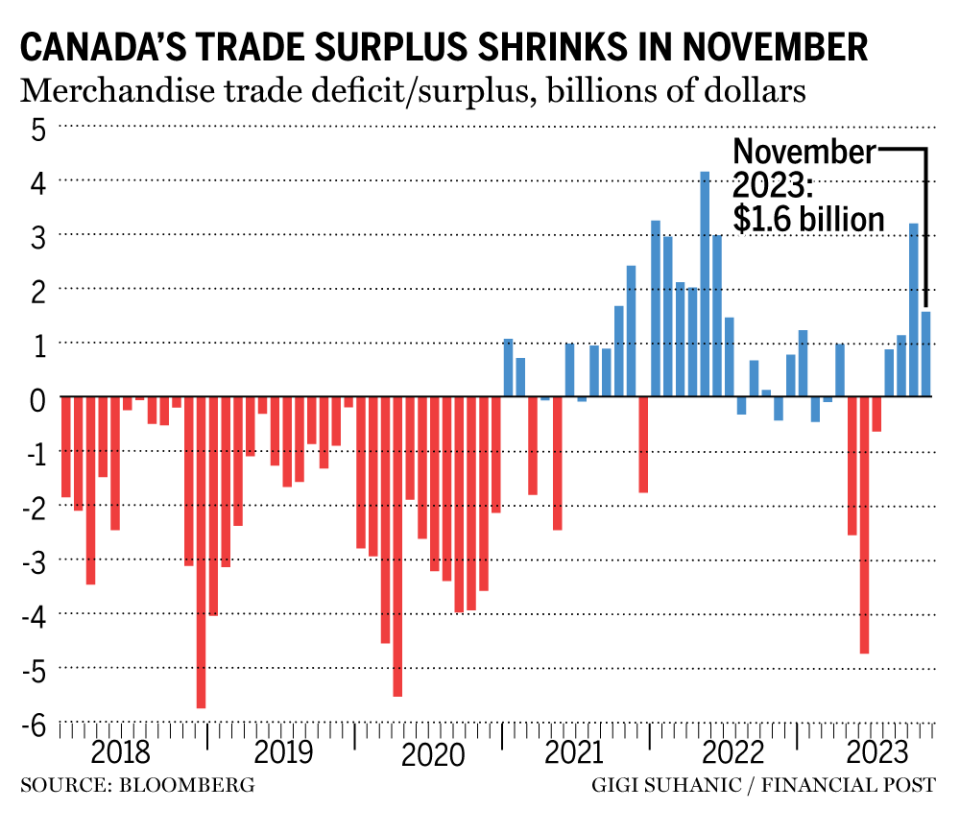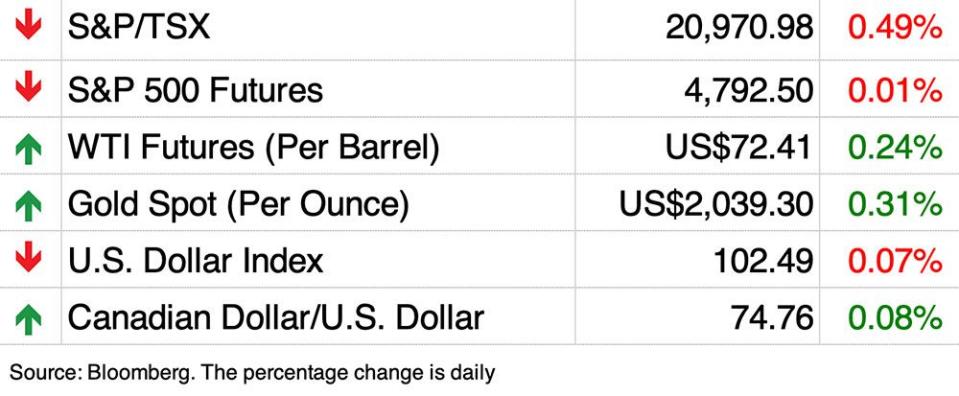Posthaste: Dissatisfaction with provincial governments is 'stark and growing' — here's why


Canadians appear to be growing increasingly disgruntled with their home provinces over concerns they’re failing to adequately address issues such as the rising cost of living, health care and affordable housing in the wake of the pandemic.
Provincial government approval ratings tied to delivery of government services have steadily dropped since 2020 in the fallout from the COVID-19 pandemic, according to a new report from the non-profit Angus Reid Institute.
“One of the stories being penned as the calendar pages turn is the stark and growing dissatisfaction with government services since 2020,” the report said.
Health care, a top concern among those surveyed, continues to disappoint across all provinces, with the number of those saying the government has done a good or very good job dropping to an average of 24 per cent in 2023 from 49 per cent in 2020. Approval has plunged the most in British Columbia, where an average 27 per cent of people gave a thumbs-up in 2023, compared to 63 per cent in 2020. Ratings were lowest in New Brunswick, where only 11 per cent were satisfied with the province’s performance last year, compared to 42 per cent in 2020.
Housing affordability is another area getting dismal scores. As elevated interest rates push mortgage rates and rents higher, Canadians have become more critical of how provinces are managing the affordability crunch, Angus Reid said. Approval ratings fell in every province since 2020, with just 15 per cent rating their province as good or very good at handling housing in 2023. That’s compared to an average of 27 per cent in 2020.
The numbers on housing don’t look much better to start off 2024. People living in Saskatchewan are most happy with their province’s performance, Angus Reid’s most recent research shows, but the number satisfied is still low at only 33 per cent. Coming in second is Alberta, where 25 per cent of residents say the government is doing a good job addressing affordability. On the other side of the spectrum, people in Quebec and Nova Scotia appear least content, with just 10 per cent voicing approval.
Another top issue among Canadians heading into 2024 is inflation, and there too, grades are low. Just 36 per cent say they’re content with their province’s response to the rising cost of living. Approval is lowest in New Brunswick and Ontario, where 86 per cent and 83 per cent, respectively, say the province is doing a poor or very poor job managing higher costs.
But despite handing out dismal ratings on the rising cost of living and housing, people don’t appear as critical of governments’ overall handling of the economy over the last three years. Around half of those in Alberta, 56 per cent in Saskatchewan and 48 per cent in Quebec say their provinces are doing a good job. Across all provinces, that number came in at an average 41 per cent in 2023. Still, that’s a marked decrease from 52 per cent approval in 2020.
Some provinces have more reason to work on improving their scores than others. B.C., Saskatchewan and New Brunswick are all due to hold elections this year. But whether that will spur change is up in the air, Angus Reid said.
“Whether any provincial government can break this trend and turn the views of their constituents around … remains to be seen,” the report said.
Sign up here to get Posthaste delivered straight to your inbox.

Canada’s merchandise trade surplus narrowed to $1.6 billion in November as imports rose and exports fell, Statistics Canada said Jan. 9.
Total imports rose 1.9 per cent, helped by an 11.6 per cent increase in imports of energy products, boosted by imports of uranium from Kazakhstan. Imports of refined petroleum energy products also rose 18.8 per cent, on higher imports of gasoline and aviation fuel from the United States.
Total exports fell 0.6 per cent as exports of metal and non-metallic mineral products dropped 6.5 per cent, mainly on lower exports of unwrought gold, silver, and platinum group metals. Exports of aircraft and other transportation equipment and parts fell 16.8 per cent.
In volume terms, total imports in November were up 1.6 per cent, while exports were down 0.1 per cent. — The Canadian Press
BlackBerry Ltd. will host an interactive investor-focused question-and-answer session with members of the IoT management team to be streamed from the BlackBerry IoT booth at CES 2024 in Las Vegas at 4 p.m. ET.
Today’s data: U.S. wholesale trade
Earnings: Aritzia Inc., Cogeco Inc.
Get all of today’s top breaking stories as they happen with the Financial Post’s live news blog, highlighting the business headlines you need to know at a glance.

One in five restaurants in Canada at risk of not surviving as CEBA deadline looms, say advocates
More softening ahead for Canada’s jobs market, but wage hikes, hybrid work to have staying power
Canada needs to stay on the right fiscal track or risk the bond market’s wrath
Thinking of leaving Canada? There’s more than just personal tax rates to consider
Canadian personal tax rates may be too high, don’t compare favourably with those in the United States and are driving many successful people out of the country, but to be fair, there are many considerations other than high taxes that go into a decision to leave and become a non-resident for income-tax purposes. Tax expert Kim Moody explains what they are.
Today’s Posthaste was written by Victoria Wells, with additional reporting from Financial Post staff, The Canadian Press and Bloomberg.
Have a story idea, pitch, embargoed report, or a suggestion for this newsletter? Email us at posthaste@postmedia.com.
Bookmark our website and support our journalism: Don’t miss the business news you need to know — add financialpost.com to your bookmarks and sign up for our newsletters here.

 Yahoo Finance
Yahoo Finance 




